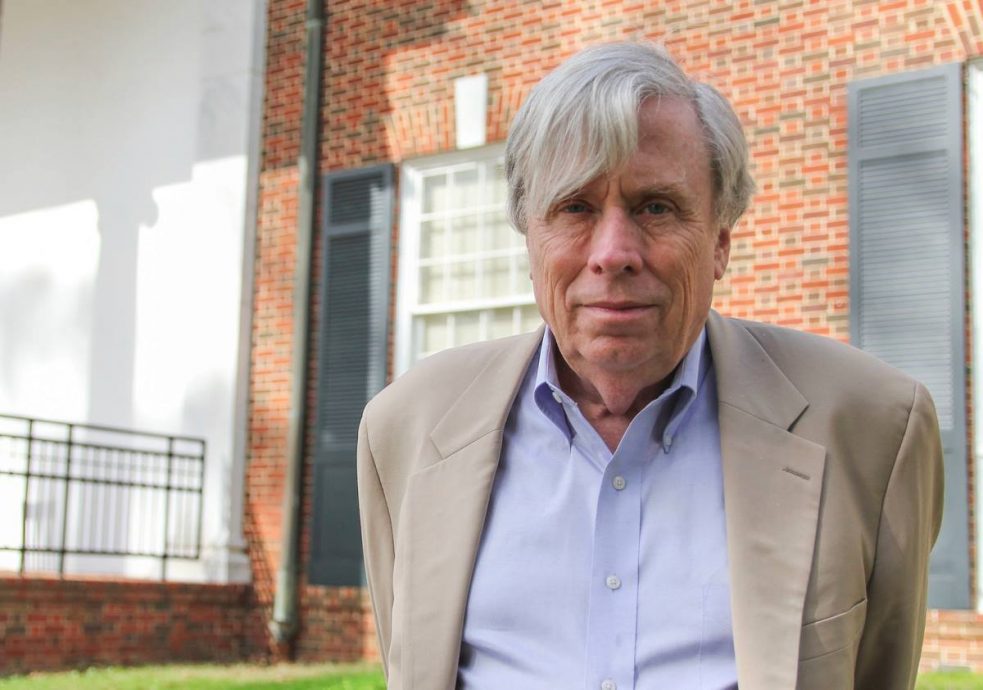A new book by a Harvard Business School professor does not, alas, illuminate what it might be.
Peter Lawler, A Year Gone By
It’s already been a year since Peter Lawler died. The shock has worn off, the initial tributes composed and published, the wonderful memorial service experienced. What remains are the memories and the writings. So many of both! And, from time to time, a “What would Peter say?” about our ongoing national life, as well as the new cultural products that cross our screens and consciousness. So, in the past year we celebrated him, we missed him, and we continued to honor him by reading and thinking about him. The anniversary offers another opportunity for all three.
We especially have missed what he would say about the significant changes, the ongoing transformations, in our country. To begin with, in the two major parties—the Trump takeover, the Republican elite disoriented and sidelined, and the Democratic Party’s resistance and further moves to the left. Connected with them, the electoral revelation of “the deplorables” (not least to themselves) and their “Pox on both your houses” revolution; and, in the opposite direction, the increasing detachment of Silicon Valley from the rest of America and the distrust it receives in return.
Technocratic Humanitarianism
Peter’s friendship with Peter Thiel would give him insight into the recent self-criticism of contemporary technocrats, as well as their ongoing transformative dreams and projects. I suspect he’d point out the partial truth of the self-criticism (and the significant fact that it is occurring), while continuing to argue that it’s not a bad thing to be human, so the endeavor to transcend the human condition is actually better understood as misanthropy. In any event, “We’re still stuck with virtue” for the foreseeable future, since the “perfection” (and hence disappearance) of our humanity is nowhere in sight. We’re still born to trouble. One could ask Sheryl Sandberg about this.
Given his Socratic bent, I can also see Peter weaving together the confessions of technocratic defectors with statements from its hold-out apologists (“We’ll do it better this time!” “Your privacy is safe with us!”), and thus displaying the conflicted human consciousness at work in building the brave new technological world. On the one hand, earnestly creating a Better World, on the other, anxiously trying to understand that world and oneself-in-it, and having to deal with unexpected human complications and belated moral misgivings.
This would provide an opening for a more measured appreciation of technology and social media, while also providing an opportunity to instruct in other aspects of human relatedness. As the French political philosopher Pierre Manent put it, communication is not connection. Peter himself was all about understanding man as a person, a “relational being” with spiritual longings in a mortal frame. He discerned the longings in garbled form among the technocrats and transhumanists, which allowed him to be both understanding and critical.
Among the key critical points was the dangerous impoverishment of the view of reason presupposed and inculcated by technocratic thinking, and the abstract, utopian character of the ‘coat-of-many-colors’ humanity it envisaged and sought to bring into being. In academe, the tide of STEM education needed to be stemmed by a renewed appreciation of the humanities (“rightly understood,” he would add); and a relational view of the human person importantly includes one’s ties—of gratitude and obligations—to one’s political community, to one’s country, to one’s nation.
In connection with the last point, Manent was the chief contemporary guide (along with Roger Scruton), while Orestes Brownson was an earlier American one, with his views of the providential constitution, territorial sovereignty, and the chief political virtue of loyalty. More recently, Manent had defended the natural, and hence contemporary, “political character of mankind,” which put paid to the fantasies of contemporary humanitarianism, the moralizing complement to technocratic rationality. A felt need for politics in its Aristotelian amplitude, a real attachment to the country, America, were at the positive core of the Trump appeal. “We want our country back” was deemed xenophobic and racist by globalist multicultural detractors, but Peter, closer to them, heard a demos that wanted democracy, citizens who wanted patriotism acknowledged.
Breakfast at Waffle House
Concerning the deplorables, his trips to Waffle House and the Landmark Diner gave Peter insights that sociologists are only now catching up with. These forays, tellingly, were not conducted in the spirit of field research. He actually knew those who passed the syrup, he knew them as friends and acquaintances, as parents, fellow citizens, and religious believers. That kind of familiarity inoculated him against the “xenophobic, racist, etc.” characterizations first offered and still on offer from certain quarters. Neither to be demonized nor patronized, they were, more accurately, to be characterized as . . . humans. As such, their opinions should be taken seriously and they could be criticized, perhaps refined, during breakfast conversations.
Republicans Rethinking Republicanism
As for the political parties, it’s harder to say what he might say. He was among the first to surmise that the Trump and Sanders insurgencies, one yuugely successful, the other defeated by an establishment that played hardball, portended seismic party and electoral realignment. On the Right, I’m sure he would have tracked the retirements of Republican politicians facing electoral defeat or contemplating the defeat of their hopes for their agendas (Paul Ryan), as tea leaves that needed to be read in order to discern the Republican future. I’m also sure that he would have continued to read and weave together the analyses of his go-to starboard analysts: Yuval Levin, Henry Olsen, and Pete Spiliakos.
From Levin he learned the need to articulate a “reform conservatism” that addresses real issues of insecurity in the middle class, while from Spiliakos he learned that the Republican donors and establishment are part of the problem, not a solution. And from Olsen he learned a good deal of what social science wedded to practical judgment could teach about the Republican constituency, actual and potential. These, along with others (such as the libertarians Charles Murray and Tyler Cowen), would contribute elements that he would form into a distinctive Lawlerian whole. Still, because the Republican situation was fluid, very little would be written in ink.
Peter’s Principles
Certain principles and preferences would come to the fore. I’ll indicate a few characteristic ones. The first two have to do with our relationship to history. Peter was a critic and advocate of “selective nostalgia.” This required a distinction. He was a critic when it whitewashed the past and served as blinders to real problems today. (He was also a critic when it simply blackened the past and saw nothing good in it.) For Republicans, this meant the reminder: it is not always 1976 (or 1932 or 1854).
On the other hand, selective nostalgia is a way of rooting present projects for improvement in past achievements. Sometimes, even, the past could serve as an antidote to present blind spots. To take an example he often employed: Tocqueville had counseled pragmatic Americans to study the literary refinements of Greek and Latin classics in order to sharpen and deepen their rather utilitarian and abstract minds. There was no danger of a restored aristocracy, but there was a democratic blind spot that aristocracy could remedy. A healthy conservatism, a healthy polity, had a healthy relationship to its past, one that was critical or discerning, but also appreciative and nourishing. Peter’s review of Levin’s Fractured Republic, from which he drew the phrase “selective nostalgia,” emphasized this human and political need, extending it, in a bipartisan way, to both conservatives and liberals.
“Things are always getting better and worse” was a quintessential Lawlerian dictum. It was often paired with a golden sentence from Solzhenitsyn: “It is up to us to stop seeing Progress (which cannot be stopped by anyone or anything) as a stream of unlimited blessings, and to view it rather as a gift from on high, sent down for an extremely intricate trial of our free will.” He cited this passage when he was on the President’s Bioethics Council—it was good advice for considering various biotechnological developments, and he applied it to a variety of social, cultural, and constitutional developments.
With it, he found himself between many conservatives and most progressives: too accepting of certain changes for the conservatives, too wedded to the past and discerning of present-day losses for the progressives. When it came to the then hot-button issue of the day, the status of gays and lesbians in our common life, his commentary on cultural and legal developments from TV shows to Obergefell walked this ambiguous line. He absolutely affirmed homosexuals’ full human dignity and civic equality. That proposition, however, while necessary, was insufficient to address important questions concerning their participation in the various institutions of our common life, including the fundamental one of marriage. Better and worse framed his judgment of events and outcomes.
He understood the commitment of social conservatives to the traditional understanding of marriage, a one-flesh union of man and woman, but he also sympathized with the aspiration for full civic equality in the same-sex marriage movement. He rather dispassionately observed the decisive shift when corporate America put its considerable clout behind the movement, and he counseled conservatives to move on to a defense of religious liberty after the inevitable defeat provided by the Obergefell decision.
The take-away for the Republican Party thus counseled by Peter, it seems to me, is that its attachment to the Constitution and constitutionalism, already attenuated, would be further compromised if religious freedom fell by the wayside. It is true, however, that in one of his last writings, a book coauthored with Richard Reinsch (coming soon), he argued that on the basis of Justice Kennedy’s Obergefell decision, in which dignity was “relational,” the human relation to the divine and to fellow believers, that is, religious liberty for individuals and institutions, should receive equal protection from the Court. Helen Alvaré has made a similar argument. We will soon see how it is received by the Court.
Sizing up the Elephant in the Room
Now we come to the elephant in the Republican room: Donald Trump. Concerning the Trump phenomenon, it’s even harder to say what Peter would say these days. He was neither a Trumpista nor an anti-Trumper. He could understand where Michael Anton was coming from, but he also understood William Kristol and Jonah Goldberg’s concerns about winning at the cost of losing principle and moral consistency. Threading the needle was as hard for him as it was for many of us.
In some sense, of course, this freed him to make independent and equitable judgments. The subject, however, is particularly recalcitrant to equitable anything. I will not put words in Peter’s mouth. There is one fairly big thing I am fairly sure of, though.
When one asks, what was Peter’s lodestar in judging and evaluating American politics?, while there are a few candidates that come quickly to mind—the Constitution and constitutionalism, moderation, civic friendship, and the Republican Party, probably in that order—his lodestar, as befits a Christian, was the human person. And among the three elements of the body politic, elites, the middle class, and the lower classes, his heart was with the middle class. This set him apart from Christian progressives and their preferential option for the poor (including the immigrant and refugee). It also gave him a certain distance, usually ironically bridged, from elites. We have already seen something of his critique of Silicon Valley technocrats and his defense of the humanity and human virtues of the deplorables.
So, while he could judge President Trump by all sorts of moral criteria (whether the Aristotelian canon or those endorsed by the moral politician par excellence, Václav Havel), and while he could evaluate him in a more contextual manner (for example, originally vis-à-vis the Clinton Alternative, now against malevolent public servants), or even in light of “the needs of the time,” as a foul-mouthed tribune of the people against the optimates, two criteria—or rather, two human attachments and affections—would not be far from his thoughts.
The Middle Class, Quintessentially Human, and Underserved
In many of his writings, Peter laid out how the middle class was the class that best represented our middling status as human beings, neither gods nor beasts, and, following Aristotle, that it constituted the most stable regime and was the part that connected the extremes. He therefore observed with increasing concern the decline and unraveling of that central part. He was among the first conservative thinkers to tell conservatives and the Republican Party that the safety net, the social welfare state in fact, was now needed as much, or more, than ever.
To be sure, he knew by heart the conservative catechism about dependency. But he looked beyond dogma to actually see the moral character, the hopes and fears, of blue collar workers and the middle managers, erstwhile economic and political opponents, now ill-served by their parties and partisan leaders.
Adopting their perspective, therefore, Peter would appreciate in Trump his acknowledgement that their elite’s program had failed them in certain ways, and that he saw in them not just stressed economic agents but fellow citizens. Giving voice to those who believed they were not heard was no mean achievement, even if it was a foul and crude voice. At the very least, the voice of political correctness was no longer unchallenged. There was room for a new kind of word (an old one in fact): a political word, a word that centered around “us,” our nation, and self-rule.
The Political Philosopher’s Service
However, Peter had also learned from Tocqueville (and Aristotle) that the political philosopher needs to see not just as, but further than, the partisans, for the middle class too has its blind spots and biases. To understand the connection between Trump and his followers was not to agree to everything said or believed by either party. There was a need for critique as well as enlargement and refinement.
Here Peter’s other criteria, constitutionalism, moderation, and civic friendship, would come into play. Undergirding them, informing them, would be his deepest commitment, to the Christian teaching of the human person—all human persons, including political opponents.
The last teaching, of course, is both most needed and least likely to be heeded in our times of fracture and animosity. However, the same God who creates persons gave Peter the rare gift of benevolent irony. With it, he could speak in winsome ways to political friends and foes alike. This may be the thing I miss most about Peter.



